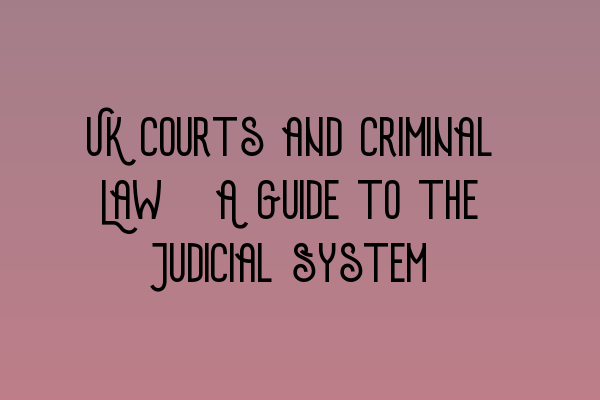UK Courts and Criminal Law: A Guide to the Judicial System
Welcome to the comprehensive guide on UK courts and criminal law. Whether you’re a law student, legal professional, or just someone interested in understanding the British legal system, this guide will provide you with a solid understanding of how criminal law works in the UK.
1. Overview of the UK Judicial System
The UK judicial system is divided into multiple courts that handle various types of legal cases. These courts ensure that justice is served and the rights of individuals are protected. The main courts in the UK include:
- Supreme Court: The highest court in the UK, which deals with cases of constitutional importance and final appeals.
- Court of Appeal: Hears appeals against decisions made by the High Court and other lower courts.
- High Court: Deals with cases that require a high level of complexity or importance.
- Crown Court: Handles serious criminal cases.
- Magistrates’ Court: Deals with less serious criminal cases and some civil matters.
2. Criminal Law in the UK
Criminal law in the UK governs behavior that is considered to be a criminal offense. It is enforced by the police and prosecuted by the Crown Prosecution Service (CPS). The basic principles of criminal law in the UK include:
- Mens rea: The mental element of crime, meaning the defendant must have had a guilty mind.
- Actus reus: The physical element of crime, referring to the action or conduct that constitutes a crime.
- Elements of a Criminal Offense: For an act to be considered a crime, it must meet certain elements, such as intent, causation, and consequences.
- Burden of Proof: The prosecution has the burden of proving the defendant’s guilt beyond a reasonable doubt.
3. The Criminal Trial Process
The criminal trial process in the UK typically involves the following stages:
- Investigation: The police investigate the alleged crime and gather evidence.
- Arrest: If there is sufficient evidence, the police may make an arrest.
- Charge: The defendant is formally charged with the offense.
- First Appearance: The defendant appears before the Magistrates’ Court for the first time.
- Pre-trial Proceedings: Various pre-trial processes, including case management hearings and disclosure of evidence, take place.
- Trial: The trial takes place in either the Magistrates’ Court or the Crown Court.
- Verdict: The court determines the defendant’s guilt or innocence.
- Sentencing: If the defendant is found guilty, the court imposes a sentence.
- Appeals: The defendant or the prosecution may appeal the court’s decision.
4. Legal Representation in Criminal Cases
In the UK, defendants in criminal cases have the right to legal representation. They can choose to be represented by a solicitor or a barrister. Solicitors provide legal advice, while barristers specialize in advocacy and represent clients in court.
Legal aid may be available for those who cannot afford legal representation. The Legal Aid Agency provides funding for individuals who meet certain eligibility criteria. It is essential to engage a competent and experienced legal representative to protect your rights and present a strong defense.
Conclusion
Understanding the UK courts and criminal law is vital for anyone involved in the legal field. From the different types of courts to the criminal trial process, being aware of the intricacies of the UK judicial system will help you navigate the world of criminal law in a knowledgeable and effective manner.
For further resources and exam preparation for aspiring law professionals, consider exploring the following related articles:
- SQE 1 Practice Exam Questions
- SQE 1 Practice Mocks FLK1 FLK2
- SQE 2 Preparation Courses
- SQE 1 Preparation Courses
- SRA SQE Exam Dates
Remember to stay informed, stay updated, and continue developing your knowledge and skills in the ever-evolving field of criminal law in the UK.
